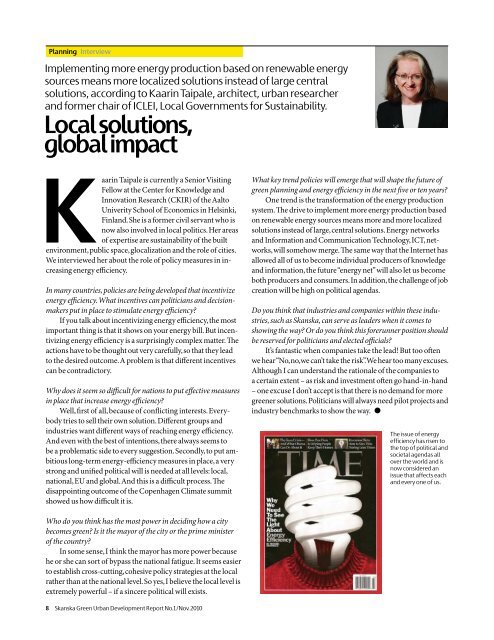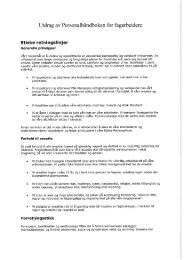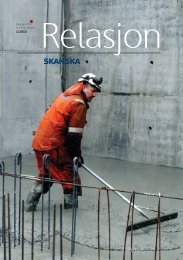Green Urban Development Report No.1 - Skanska
Green Urban Development Report No.1 - Skanska
Green Urban Development Report No.1 - Skanska
You also want an ePaper? Increase the reach of your titles
YUMPU automatically turns print PDFs into web optimized ePapers that Google loves.
Planning Interview<br />
Implementing more energy production based on re new able energy<br />
sources means more localized solutions instead of large central<br />
solu tions, according to Kaarin Taipale, architect, urban researcher<br />
and former chair of ICLEI, Local Governments for Sustainability.<br />
Local solutions,<br />
global impact<br />
K<br />
aarin Taipale is currently a Senior Visiting<br />
Fellow at the Center for Knowledge and<br />
Innovation Research (CKIR) of the Aalto<br />
Univerity School of Economics in Helsinki,<br />
Finland. She is a former civil servant who is<br />
now also involved in local politics. Her areas<br />
of expertise are sustainability of the built<br />
environment, public space, glocalization and the role of cities.<br />
We interviewed her about the role of policy measures in increasing<br />
energy efficiency.<br />
In many countries, policies are being developed that incentivize<br />
energy efficiency. What incentives can politicians and decisionmakers<br />
put in place to stimulate energy efficiency<br />
If you talk about incentivizing energy efficiency, the most<br />
important thing is that it shows on your energy bill. But incentivizing<br />
energy efficiency is a surprisingly complex matter. The<br />
actions have to be thought out very carefully, so that they lead<br />
to the desired outcome. A problem is that different incentives<br />
can be contradictory.<br />
Why does it seem so difficult for nations to put effective measures<br />
in place that increase energy efficiency<br />
Well, first of all, because of conflicting interests. Everybody<br />
tries to sell their own solution. Different groups and<br />
industries want different ways of reaching energy efficiency.<br />
And even with the best of intentions, there always seems to<br />
be a problematic side to every suggestion. Secondly, to put ambitious<br />
long-term energy-efficiency measures in place, a very<br />
strong and unified political will is needed at all levels: local,<br />
national, EU and global. And this is a difficult process. The<br />
disappointing outcome of the Copenhagen Climate summit<br />
showed us how difficult it is.<br />
Who do you think has the most power in deciding how a city<br />
becomes green Is it the mayor of the city or the prime minister<br />
of the country<br />
In some sense, I think the mayor has more power because<br />
he or she can sort of bypass the national fatigue. It seems easier<br />
to establish cross-cutting, cohesive policy strategies at the local<br />
rather than at the national level. So yes, I believe the local level is<br />
extremely powerful – if a sincere political will exists.<br />
8 <strong>Skanska</strong> <strong>Green</strong> <strong>Urban</strong> <strong>Development</strong> <strong>Report</strong> <strong>No.1</strong>/Nov. 2010<br />
What key trend policies will emerge that will shape the future of<br />
green planning and energy efficiency in the next five or ten years<br />
One trend is the transformation of the energy production<br />
system. The drive to implement more energy production based<br />
on renewable energy sources means more and more localized<br />
solutions instead of large, central solutions. Energy networks<br />
and Information and Communication Technology, ICT, networks,<br />
will some how merge. The same way that the Internet has<br />
allowed all of us to become individual producers of knowledge<br />
and information, the future “energy net” will also let us become<br />
both producers and consumers. In addition, the challenge of job<br />
creation will be high on political agendas.<br />
Do you think that industries and companies within these industries,<br />
such as <strong>Skanska</strong>, can serve as leaders when it comes to<br />
show ing the way Or do you think this forerunner position should<br />
be reserved for politicians and elected officials<br />
It’s fantastic when companies take the lead! But too often<br />
we hear “No, no, we can’t take the risk”. We hear too many excuses.<br />
Although I can understand the rationale of the companies to<br />
a certain extent – as risk and investment often go hand-in-hand<br />
– one excuse I don’t accept is that there is no demand for more<br />
greener solutions. Politicians will always need pilot projects and<br />
industry benchmarks to show the way. ●<br />
The issue of energy<br />
efficiency has risen to<br />
the top of political and<br />
societal agendas all<br />
over the world and is<br />
now considered an<br />
issue that affects each<br />
and every one of us.
















